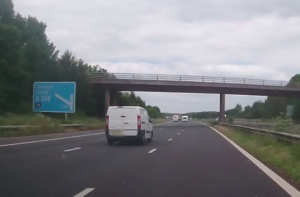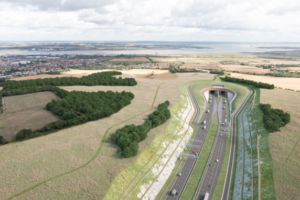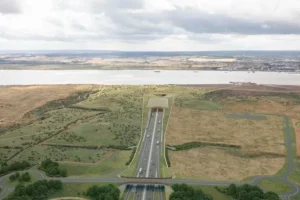When it came to installing the new Allerdene bridge as part of a multimillion-pound National Highways upgrade to the A1 network, temporary works was a critical element given the poor ground conditions on site. Costain turned to Mabey Hire for its expertise.
The A1 is a critical part of the UK’s highway network, with the Newcastle Gateshead Western Bypass in particularly being one of the most congested sections in the North East. With traffic levels expected to only increase, National Highways planned improvements to the A1 via the Birtley to Coal House scheme, including widening the north and southbound carriageway and replacing the existing Allerdene railway bridge which carries the highway over the East Coast Mainline.
The new bridge structure consists of 16 central girders, installed as braced pairs, comprising over 3000 tonnes of structural steel and decking. Understandably, the assembly and installation of the bridge presented project teams with a considerable logistical challenge, requiring a bespoke series of temporary works.
Ben Adcock, Lead Temporary Works Co-ordinator at Costain, principal contractor on the project, said: “Due to the poor ground conditions experienced in the local area, the geotechnical team anticipated a significant movement could occur at the back-span embankment and abutments during the construction of the embankment. As a result, we were unable to land the new bridge deck directly onto the new abutments, as the bridge bearings would be unable to cope with the movement and loads experienced.
“Due to this, the temporary works proved critical to continuing to meet the programme requirements. We needed a temporary propping and trestle scheme that would provide additional support to the back span beams of the bridge deck at both the east and west abutment locations during the initial install, before we could remove gradually and transfer the deck loads to the permanent abutment.
“We turned to Mabey Hire for the temporary works aspect of the project, as it’s widely known that propping is an area they really excel in. We knew that Mabey Hire and its wider teams could be relied upon to deliver a good service at the right time.”
Mabey Hire designed and supplied the temporary propping and jacking scheme for the project, which included a combination of its Mat 125 and Mass 50 props, along with Hymat jacks.
Andrew Gascoine, Mabey Hire’s Digital Engineering Manager added: “Our engineering team had significant loads to consider, with the self-weight of the individual bridge components and a dead load in excess of 700kN underneath each girder. We were tasked with developing a significant propping and jacking system that was capable of supporting approximately 11,000kN on the west abutment. As well as the dead loads, it was also important to consider the significant imposed loads, including wind.”
Given the scheme complexity and in order to facilitate the installation of the new bridge’s large steel main girder, Mabey Hire also developed a stability restraint system to ensure a safe and efficient assembly process on site.
Ben explained “As the bridge is in the process of being erected, it is important that its components are restrained from moving transversely, allowing only longitudinal movements as it expands and contracts naturally. Mabey Hire’s bespoke stability restraint system mimicked this behaviour, safely supporting the main steel girder as our Costain site teams erected the rest of the bridge structure and decking around it.”
Mabey Hire was recently able to remove the four propping systems on site, following completion of the bridge decks and it being opened to traffic. Allerdene Bridge is expected to fully open to traffic in late 2023.
With over 60 years’ experience in the temporary works sector, Mabey Hire has an extensive range of propping, jacking, groundworks and bridging solutions available, with full support across equipment supply, design, installation and monitoring.























